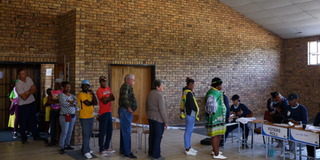South African opposition competes in the courts and at the ballot

People queue to vote at a polling station during the South African elections in Hopetown, Northern Cape province, South Africa May 29, 2024.
What you need to know:
- Former President Jacob Zuma’s Umkhonto weSizwe (MK Party) was the latest to take legal action on Tuesday after he submitted urgent papers to the Electoral Court over President Cyril Ramaphosa’s address to the nation on Sunday night.
- In a statement released Tuesday, MK Party alleged that president Ramaphosa had violated the Electoral Code of Conduct by misusing his position of authority to sway results of the elections.
South African opposition political parties may be competing on the ballot against the ruling African National Congress (ANC). But they are also taking cases to court to challenge what they call impunity by the ruling party.
This has raised the tempo, and tensions, as more than 27.7 million South Africans throng polling stations around the country to vote for their most preferred political party.
Former President Jacob Zuma’s Umkhonto weSizwe (MK Party) was the latest to take legal action on Tuesday after he submitted urgent papers to the Electoral Court over President Cyril Ramaphosa’s address to the nation on Sunday night.
In a statement released Tuesday, MK Party alleged that president Ramaphosa had violated the Electoral Code of Conduct by misusing his position of authority to sway results of the elections.
The newly-formed party emphasized that the code explicitly forbids any candidate or party from leveraging their power to manipulate the electoral process.
“Given the massive legal team around him, it is our contention that Ramaphosa has knowingly misused his presidential office to deploy state resources in a manner that unfairly benefits his corrupt and desperate political party, the [African National Congress] ANC,” said MK Party spokesperson, Nhlamulo Ndhlela.
“This includes the national broadcaster and other public media outlets, which were disingenuously used to broadcast an election campaign speech, which he used throughout his dismal campaign under the guise of a national address.”
The national address, ANC argued, is a routine job of a sitting head of state who must assure the public that government operations will continue normally, in spite of an election day.
The MK party emphasized the significance of not overlooking the influence of President Ramaphosa’s actions. They are urging the court to intervene in response to what they claim was misuse by the president, who is accused of using a national address for political campaigning.
“By leveraging state infrastructure for partisan gain, Ramaphosa and his ANC have not only undermined the principles of fair play and equity essential to democratic competition but also potentially skewed the electorate’s perception right before the national elections on Wednesday,” stated Mr Ndhlela.
He added that in the MK Party’s affidavit, they requested the Electoral Court to cancel the ANC’s registration as a political party.
The affidavit also called for criminal proceedings against President Ramaphosa, with penalties severe enough to reflect the seriousness of the infringement, including potential imprisonment.
MK isn’t the only one fighting in courts. The Democratic Alliance (DA) requested that 1 percent of the ANC votes in the Wednesday’s election be invalidated, and that President Ramaphosa be fined R200,000 ($10,954) for what they perceive as a “thinly veiled political campaign” during a Sunday national address.
The DA is also accusing President Ramaphosa of breaching the Electoral Code of Conduct by using his position for blatant electioneering. They escalated their challenge directly to the President, alleging that he misused his authority for political purposes.
In a founding affidavit submitted to the court, Helen Zille, the chairperson of the DA’s federal council, alleged that President Ramaphosa violated the Electoral Act and Electoral Code of Conduct by utilising a televised national address to showcase the accomplishments of his government.
“The address was nothing more than a thinly veiled stump speech,” Zille said in a founding affidavit. “He sought to use his position as head of state and government to encourage the public to vote for the ANC.”
President Ramaphosa’s actions violated section 94 of the Act, specifically item 9(2)(e) of the electoral code, which prohibits the use of positions of power to sway election results, as well as section 87(1)(g), which prohibits the misuse of public funds for campaign purposes.
The DA party has acknowledged that its application will only be heard after election day and is seeking a different remedy. It is asking the court to declare that the president breached sections 9(2)(e) and 87(1)(g) in order to vindicate the rule of law. On the other hand, the MK Party is seeking an urgent hearing from the electoral court to deregister the ANC from the vote.
The courts have helped ANC recently. For example, the ANC successfully argued that Zuma’s previous 15-month jail term made him ineligible to compete for presidency. The courts agreed and struck him from the MK candidature.
Yet even as the polls began on Wednesday, opposition parties are seeking to chip away segments of ANC support across the country and to force it into a coalition to ensure majority.




